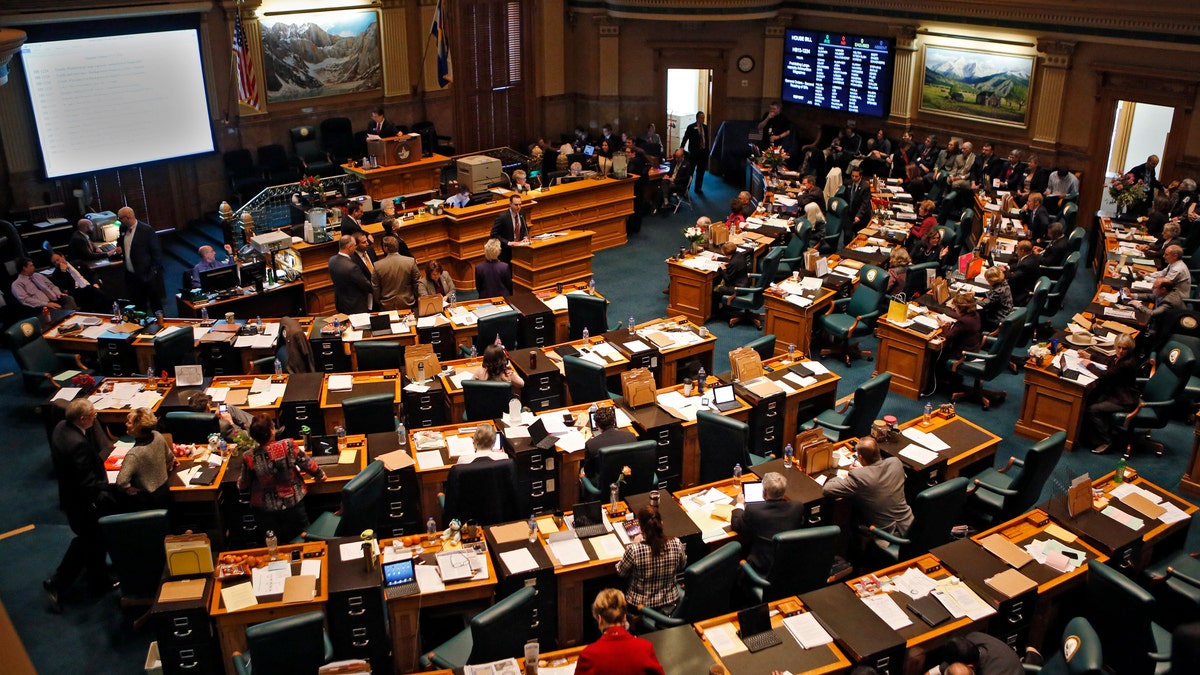
Feb. 15, 2013: House members gather at the Capitol in Denver to debate gun control legislation. (AP)
Republican lawmakers in Colorado say they want the White House to stay out of their state battle over gun control, accusing Vice President Biden of personally leaning on Democratic legislators for their votes in a tight campaign that could change the national conversation on gun rights.
Republican state Rep. Carole Murray told FoxNews.com she doesn’t appreciate “East Coast politics” interfering in her state.
The concern comes ahead of a tense Senate vote -- which could come late next week -- and after a vote in the House that prompted the White House to take the unusual step of lobbying wavering Democrats. Biden’s office confirmed to FoxNews.com he made four phone calls to Colorado Democrats, two in moderate districts, but did not say what they were about.
Multiple sources, though, tell FoxNews.com that about eight hours into last week’s 12-hour House debate, Biden called Democrats Mark Ferrandino, Mike McLachlan, Tony Exum and Dominick Moreno to solidify support for the measures and to “remind them about the importance of the legislation.”
House lawmakers in Colorado, home to two of the deadliest mass shootings in U.S. history, narrowly passed a handful of gun control bills last week. The measures are headed to the Senate in early March where they are expected to face an uphill battle, though it's unclear what steps the White House might take this time to solidify support.
Explaining the substance of the Biden call last week, Exum told The Denver Post the vice president "said it would send a strong message to the rest of the country that a western state had passed gun-control bills."
One measure would limit magazines to 15 rounds for firearms and eight for shotguns. Every House Republican, as well as three Democrats, voted against that measure, which passed 34-31. The House also approved a bill requiring background checks on all gun purchases, including those between private sellers and firearms bought online.
The third proposal would ban concealed firearms at colleges and stadiums, while the fourth would require gun purchasers to pay for their own background checks. The closest vote was on the background check measure, which passed on a 33-32 vote.
Republicans argue that the proposals restrict their Second Amendment rights and have called the bills a “knee-jerk reaction” to the recent mass shootings in Colorado and Connecticut.
Though Democrats have a majority in both Colorado chambers, they will have a tougher time passing the legislation in the Senate, where they have only a 20-15 majority. That means Republicans and other gun rights supporters need to turn only three Democrats to defeat the bills.
Colorado has taken center stage in the country’s fight over gun control. As the White House struggles to pass gun control legislation on Capitol Hill, where a Republican majority in the House ensures that only a bipartisan bill can make it through, a successful push for such legislation in the purple, pro-gun rights state of Colorado would be seen as a major victory.
Lawyer Jan Baran, though, said lobbying state legislators from Washington would only venture into illegal territory if Biden made a promise of money for a vote.
“Unless it’s some very specific promise that involves money, it’s just good ol’ politics,” Baran said.
Colorado has attracted national interest from the National Rifle Association as well. David Keene, president of the NRA, went to Denver last month to meet with Democratic Gov. John Hickenlooper and Senate President John Morse.
Keene called universal background checks a political “sweet spot” and added that the current background check systems are underfunded and that forcing them on private sales would be logistically difficult.
Hickenlooper has said in the past he supports background checks but has flip-flopped on almost every other gun control issue – something Republicans point to as proof he’s being politically pressured.
While unusual, this is not the first time the White House has meddled in state battles.
In May 2002, negotiations over two New York congressional districts intensified after a panel of federal judges approved a plan to eliminate them, but said it was still “willing, indeed eager” to let state lawmakers create a fair plan of their own. Vice President Dick Cheney called the Republican leader of the state Senate to discuss concerns about the lines the court had drawn.
In February 2000, President Clinton used a meeting of the National Governors Association to recruit governors to lobby for a bill that would normalize trading relations with China, as part of a broad effort to build support for China’s administration to the World Trade Organization.
In June 1994, then-first lady Hillary Clinton pitched her husband’s universal health care plan to a group of Oklahoma state lawmakers, a labor leader and hospital administrators. One person who attended the event told The Saturday Oklahoman that “the implication” was there that they should ask the delegation to support the Clinton plan.




